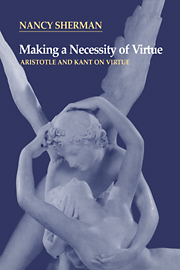Book contents
- Frontmatter
- Contents
- Preface and Acknowledgments
- Abbreviations and Notes on Translations
- Chapter 1 A New Dialogue
- Chapter 2 The Emotional Structure of Aristotelian Virtue
- Chapter 3 A Brief Stoic Interlude
- Chapter 4 The Passional Underpinnings of Kantian Virtue
- Chapter 5 The Shared Voyage
- Chapter 6 Aristotelian Particularism
- Chapter 7 Making Room for Practical Wisdom in Kantian Ethics
- Chapter 8 Perfecting Kantian Virtue: Discretionary Latitude and Superlative Virtue
- Bibliography
- Index
Chapter 5 - The Shared Voyage
Published online by Cambridge University Press: 18 December 2009
- Frontmatter
- Contents
- Preface and Acknowledgments
- Abbreviations and Notes on Translations
- Chapter 1 A New Dialogue
- Chapter 2 The Emotional Structure of Aristotelian Virtue
- Chapter 3 A Brief Stoic Interlude
- Chapter 4 The Passional Underpinnings of Kantian Virtue
- Chapter 5 The Shared Voyage
- Chapter 6 Aristotelian Particularism
- Chapter 7 Making Room for Practical Wisdom in Kantian Ethics
- Chapter 8 Perfecting Kantian Virtue: Discretionary Latitude and Superlative Virtue
- Bibliography
- Index
Summary
We have now discussed the role of emotions in Aristotelian and Kantian theories of virtue. Early on in the discussion of Aristotle's views, I touched on the intuitive idea that emotions are a kind of social fiber. They connect us with others in a way that cold reason or affectless action cannot. Moreover, certain emotions, attachment or affiliative emotions, are directed specifically at the cultivation and maintenance of relationships. These relationships, or philiai, as Aristotle would call them, are grounded in shared activity and interest. In this chapter, I explore the role of friendship or affiliation in Aristotelian and Kantian accounts of morality. The general topic of friendship has come under considerable discussion in recent years. Within political philosophy, communitarians have charged that the issue of community is not adequately addressed by a political liberalism, such as Rawls's, based in Kantian notions of the person; within moral philosophy, feminists have argued that the moral importance of family and friendship has been obscured by an overemphasis on the moral perspective of impartiality. These contemporary debates are too extensive to review here, though I hope what I have to say might shed some light on them. For the purpose of this chapter, my aim is straightforward and limited. I want to explore what it is we value about doing things together, and how it is morally significant. I begin by examining these issues more or less independently of Aristotle and Kant's writings in order to fix our own intuitions about why we are interested in the topic in the first place.
- Type
- Chapter
- Information
- Making a Necessity of VirtueAristotle and Kant on Virtue, pp. 187 - 238Publisher: Cambridge University PressPrint publication year: 1997

